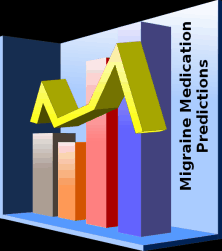Predicting: Will This Medication Work?
Which would you prefer?
- You walk into the doctor’s office, and the doctor offers you a medication that happens to interest them at the time.
- You walk into the doctor’s office, and the doctor offers you the medication that works with the highest percentage of patients with your condition.
- You walk into the doctor’s office, and the doctor checks your statistics and offers you the medication that is most likely to work for you.
I don’t know about you, but I would sure prefer #3. I would take a well-educated #2 if I couldn’t get #3. (And frankly, there are worse things than #1.)
 At this stage in migraine research, with a good specialist you’ll hopefully get a combination of #2 and #3 (and likely a pinch of #1). But researchers are trying to gather the information we need to offer more customized treatments.
At this stage in migraine research, with a good specialist you’ll hopefully get a combination of #2 and #3 (and likely a pinch of #1). But researchers are trying to gather the information we need to offer more customized treatments.
As we gain the ability to gather more information about ourselves (e.g. FitBit and Migraine), the possibility of fitting the treatment more exactly to the patient is becoming a reality.
Perhaps a more immediate benefit is avoiding treatments that aren’t likely to work. Today, there are so many migraine treatments that a patient could spend a lifetime trying them – why start with treatments that probably won’t work because you’re a) a women or b) diabetic or c) suffering from a certain symptom?
A recent study in the USA studied responses from 8233 patients with episodic migraine to see which variables could predict whether or not an abortive treatment would work. Typical go-to medications for migraine are the various types of triptans.
So here’s the question – what types of things should a doctor know, that may predict whether or not a typical abortive treatment will work?
First, symptoms.
- How intense is the headache?
- How frequent are the attacks?
- Does the patient suffer from cutaneous allodynia?
- How intense are the symptoms overall?
Second, medical profile.
- What comorbid conditions does the patient suffer from? Do they suffer from depression, for example?
- Are they taking preventative medications (for migraine)?
- Are they overusing any medications?
Finally, certain basic factors come into play, such as
- Gender
- Body mass index
These and other factors may help us better customize your treatment in the future.
In the mean time, the more information you can keep track of (don’t let it take over your life) the better. Keep in mind your medical history (and family medical history) as well, which can help your doctor a great deal.
To read the abstract of this study, go to Predicting Inadequate Response to Acute Migraine Medication: Results From the American Migraine Prevalence and Prevention (AMPP) Study from the October 2016 edition of Headache.
